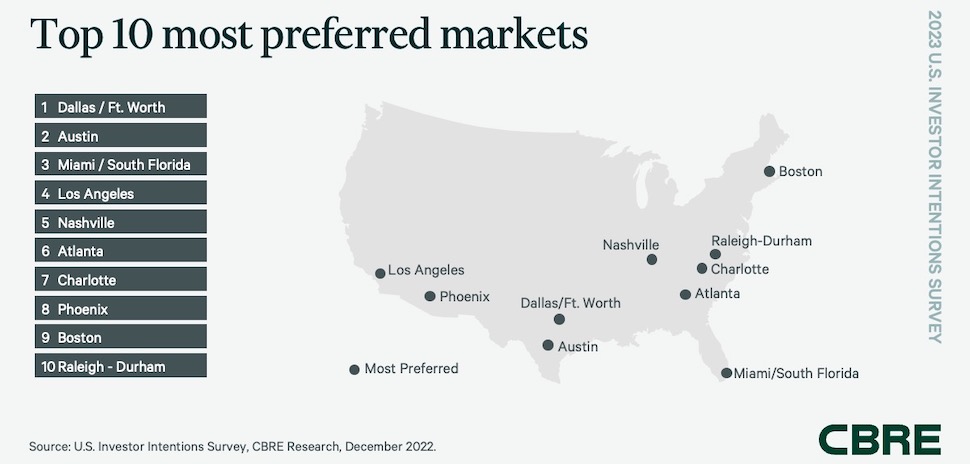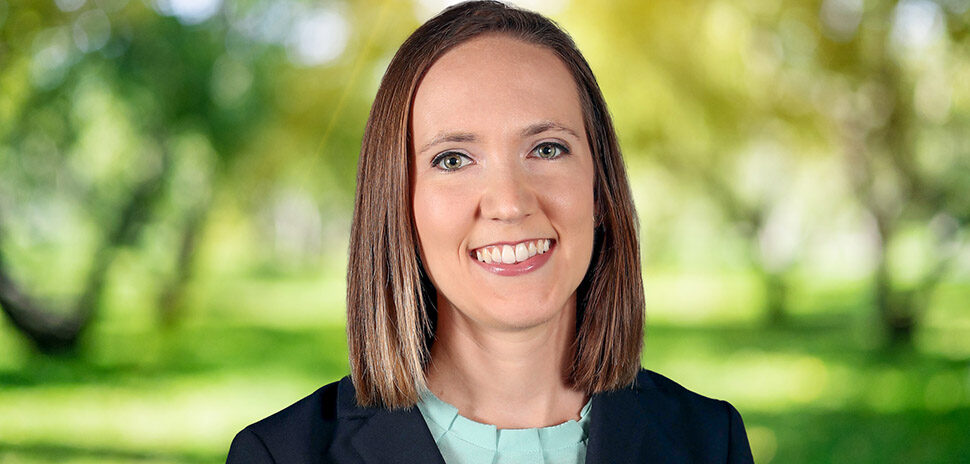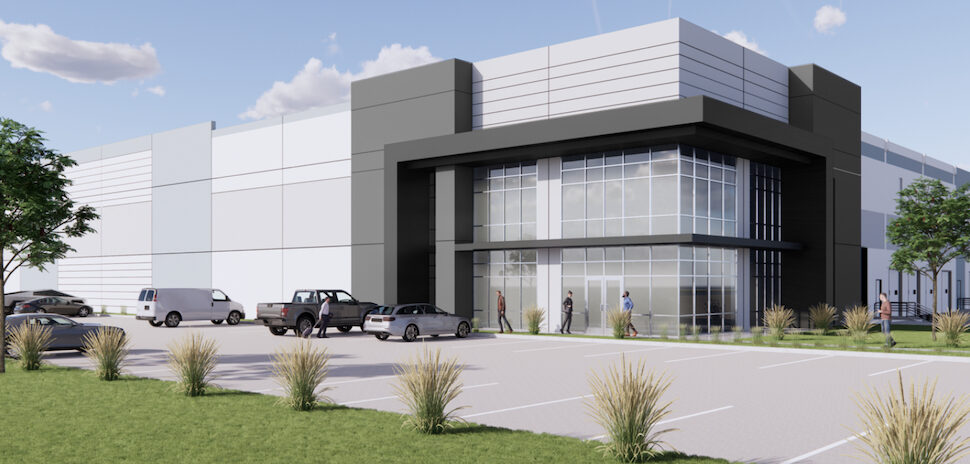Commercial real estate investors nationwide ranked Dallas-Fort Worth as the #1 market for investment among the top 10 U.S. metros, according to a 2023 U.S. Investor Intentions Survey conducted by Dallas-based CBRE.
According to the survey, more investors are looking beyond gateway markets and prioritizing high-performing secondary markets in 2023—especially Sun Belt metros with strong prospects for job and population growth, which can lead to growth in both equity and income.
Dallas-Fort Worth ranked No. 1 among the most preferred U.S. markets for investment, and No. 1 among the top 10 markets expected to outperform.
Apartment sector in DFW has ‘strong tailwinds’
“In prior downcycles, DFW has proven to be more resilient than the U.S. as a whole due to the business-friendly state government, low cost of living, high quality of life and economic diversification of the metroplex,” said Danny Baker, vice chairman and leader of CBRE’s multifamily practice group for the Midwest, said in a statement.
“More specifically, the apartment sector has proven to be the asset class that fares the best during times of high inflation due to the inherent protection provided by multifamily lease structures and robust demand-side fundamentals that are present in DFW and across the Sunbelt,” Baker added. “While there is uncertainty on a macro level, it’s apparent that the apartment sector in DFW has strong tailwinds and are once again proving resilient. Apartments will continue to be a favored property type for investors.”
Multifamily and industrial are the most sought-after sectors in U.S.
So what sectors are CRE investors interested in most nationwide? The survey says multifamily and industrial are the most sought-after sectors in the U.S., with 38% and 28% of investors surveyed preferring them most, respectively.
In the industrial sector, 66% of investors surveyed by CBRE prefer “modern logistics facilities.” Some 20% prefer “second-generation logistics facilities in major markets.”
Why DFW’s industrial sector is a strong lure to investors
According to Ryan Thornton, EVP with CBRE Capital Markets’ national partners group, industrial investors are attracted to Dallas’ product for the same reasons CEOs are moving and/or expanding their headquarters to the region.
“Ultimately, investor sentiment is largely based on population growth and DFW gained more people in the past decade than any other major U.S. metropolitan area,” Thornton said in the statement. “This provides companies with a huge talent pool for both white-collar and blue-collar employees. Moreover, DFW’s central location and pro-business environment are two significant factors driving capital to invest here long-term.”
“Both coasts are within a three-hour flight, and our highway systems make it easy to get around regionally,” Thornton added. “Combine these factors with a lack of corporate and personal income taxes, and it’s easy to see why DFW has a thriving, diversified economy that’s attractive to investors.”
DFW ranks No. 8 in target markets for new loan origination
Dallas-Fort Worth also made the Top 10 list for CRE lenders’ bullishness on high-growth secondary markets, ranking No.8 n CBRE’s 2023 ranking of target markets for new loan origination. Again, Sun Belt markets are favored among lenders with Miami landing at No. 1 on that list market, followed by Raleigh-Durham, North Carolina, at No. 2.
“Property fundamentals in DFW and the rest of the Sun Belt are solid, although moderating,” said to Mike Bryant, vice chairman and managing director of debt & structured finance for CBRE in Dallas. “Debt providers still have cautious capital to invest—albeit less than prior years—and despite increases in risk spreads, U.S. Treasuries, SOFR benchmark indexes, and higher capital costs, there is some demand from borrowers that need to transact. One bright sign is cap costs for floating rate capital has come down in the last few weeks. Additionally, more rescue capital for weaker deals and operators is beginning to surface. While only a few rescue transactions have closed, more of this capital is expected to be deployed this year.”
Other key findings from the December-conducted survey, as stated by CBRE:
• Investors cite rising interest rates, a potential recession and limited credit availability as their greatest challenges this year.
• More than half of investors expect to decrease purchasing activity in 2023 compared with 2022 levels. Amid lower pricing dynamics, 60% of respondents say they will either sell less than last year or not sell at all.
•The most sought-after sectors remain multifamily, particularly apartment complexes, and industrial, led by modern logistics facilities in major markets. Grocery-anchored centers are the most popular subsector for retail investors, while office investors largely prefer Class A assets in prime locations.
• More investors will implement opportunistic and debt strategies than last year because of attractive returns amid higher interest rates and tighter financial market conditions.
• While investors remain committed to environmental, social and governance criteria (ESG), nearly half of respondents say that the worsening economic outlook will limit the extent to which they consider ESG criteria in their investment decisions.
![]()
Get on the list.
Dallas Innovates, every day.
Sign up to keep your eye on what’s new and next in Dallas-Fort Worth, every day.





























